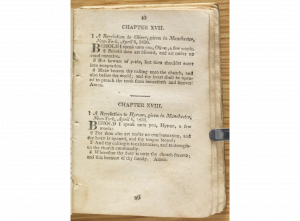Historical Context and Background of D&C 23
Brief Synopsis by Steven C. Harper
Once the Church of Jesus Christ was organized, Joseph’s brothers Hyrum and Samuel and their father, together with Oliver Cowdery and Joseph Knight, were “anxious to know of the Lord what might be their respective duties, in relation to this work.” Joseph’s history says, “I enquired of the Lord and received for them the following.”1
In section 23, the Lord speaks to each of these men in turn, offering blessings and warnings, prophecies and promises. Note especially the conditions on which the prophesied blessings depend.
Oliver Cowdery pridefully withdrew from the church in 1838 and remained out for a decade before returning humbly. During that period he wrote defensively about his importance in the Restoration. Afterward, Oliver testified meekly of the Book of Mormon and of receiving the priesthood from ministering angels along with Joseph Smith.2 When Oliver was aware of pride and made his calling known, the Lord opened his heart to preach the truth.
For Hyrum, verse 3 fulfills the Lord’s promise to him in section 11. There the Lord told Hyrum Smith that if he would learn the word of the Lord, then his tongue would be loosed to preach it. Hyrum must have studied the scriptures in the year between the two revelations, since section 23 announces that his tongue is loosed. Hyrum preached powerfully ever after. Joseph’s father and brother Samuel also became effective missionaries and church leaders in response to this revelation.
Joseph Knight had done so much for Joseph—provided money, paper for the Book of Mormon, food, transportation, and moral support. He was most comfortable behind the scenes. What section 23 commanded was more difficult for him: to join the church meant to preach the gospel. Father Knight wrote that he wrestled with the decision to be baptized but finally decided not to. A few weeks later, he and his wife chose to be baptized.
1. “History, 1838–1856, volume A-1 [23 December 1805–30 August 1834],” p. 38, The Joseph Smith Papers, accessed July 23, 2020.
2. Steven C. Harper, “Oliver Cowdery as Second Witness of Priesthood Restoration,” in Days Never to Be Forgotten: Oliver Cowdery, ed. Alexander L. Baugh (Provo, UT: Religious Studies Center, Brigham Young University, 2009), 73–89.
Additional Context by Casey Paul Griffiths
From Doctrine and Covenants Minute
Shortly after the organization of the Church, Joseph Smith received a series of short revelations on behalf of five friends and family members. All of the revelations are similar in nature and were likely given one after another. The five recipients were Oliver Cowdery, Hyrum Smith, Samuel H. Smith, Joseph Smith Sr., and Joseph Knight Sr. When the revelations were first published in the 1833 Book of Commandments, they were each published separately as chapters XVII–XXI (Book of Commandments, 1833, pp. 43–44, JSP). When the Doctrine and Covenants was published in 1835, the five revelations were combined into a single section, and the revelation has remained in this state through all successive editions of the Doctrine and Covenants (Doctrine and Covenants, 1835, 176–177, JSP).
See Historical Introduction, “Revelation, April 1830–A [D&C 23:1–2],” p. 29, The Joseph Smith Papers, accessed November 2, 2020, https://www.josephsmithpapers.org/paper-summary/revelation-april-1830-a-dc-231-2/1

